matty beniers

After a month off for the Christmas/WJC break, Michigan Hockey was back in action this past weekend against the Ohio State Buckeyes at Yost Ice Arena. It was an eventful series, with Michigan suffering a disastrous defeat on Friday night before rebounding to take the Saturday game 4-2. The split wasn't quite what Michigan wanted but it was acceptable considering the rustiness after such a break. Today we'll be talking about the OSU series, looking at the B1G and NCAA picture, and quickly checking in on the WJC results, NHL Draft notes, and Wolverines in the pros.
Ohio State's Full-Court Press
The story of this past weekend's tussle with Ohio State was what the Buckeyes did tactically to give Michigan fits. Steve Rohlik dialed up a hyper-aggressive offensive zone forecheck, one that sent F1 (the first forechecker) deep into the zone, always below the goal line, to apply immediate puck pressure on whichever Wolverine was recovering the loose puck. The other two forwards F2 and F3, were providing aggressive support, either on-puck, or pinching on the walls to take away the first outlet passes. If a Michigan player tried to skate with the puck out of the zone, F1 would stay glued onto him and another forward would arrive quickly to hound the puck. Any chips of the wall were met with a hard pinch at the point by the defensemen as well.
Here's what it looked like in action:
🚨 Cam Thiesing opened the scoring just 18 seconds into the game with his team-best 11th goal of the season.#GoBucks pic.twitter.com/nw1BmAHfQZ
— Ohio State Men's Hockey (@OhioStateMHKY) January 14, 2023
Luke Hughes gets the puck in front of his own net, tries to skate it out of the zone, and is met with immediate puck pressure. F1 separates him from the puck and F2 is right there to scoop up the loose puck and keep the possession going. It resulted in a goal on that play, but many times it didn't- it merely kept Michigan hemmed in their zone for minutes at a time. Ohio State paired this aggressive strategy on dump-ins and retrievals with a shoot from everywhere approach to offense. They flung pucks at the net from all over, knowing that Erik Portillo's struggles to control rebounds this season would end with those pucks ricocheting to the boards, where their retrieval approach could recover them quickly.
[AFTER THE JUMP: analysis and all-stars]
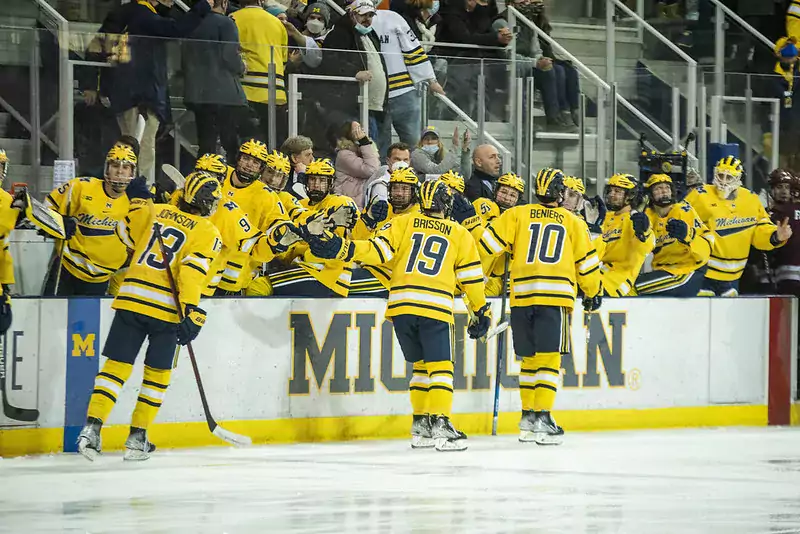
Typically we do a formal exit post when someone big from basketball or football leaves the team, and sometimes that is the case for hockey. We did not do one last week even though there was a spate of exits precisely for that reason: so many big name players were exiting for NHL/AHL deals that doing one post for each would have left you all drowning in exit posts. Instead, it felt better to do one big piece that gives a short farewell to each player that is heading to pro hockey, with a bonus take on how they will do at the next level. So here goes the Hockey Exit Bonanza.
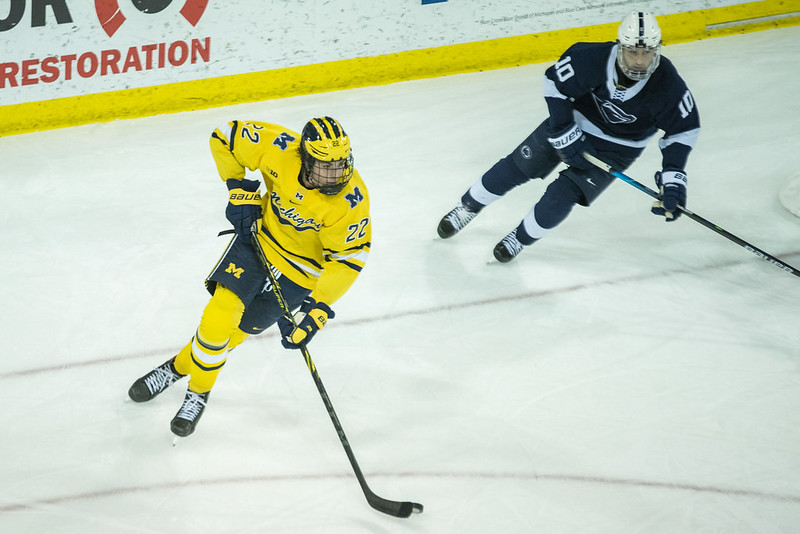
[James Coller]
Exit: Owen Power
First up is Michigan's towering defenseman, the #1 pick in the 2021 NHL Entry Draft. Power was signed by the Buffalo Sabres shortly after Michigan's season concluded and he made his NHL debut last weekend in Toronto against the Leafs. Power played two seasons at Michigan, scoring 32 points in 33 games this past season to earn All-America honors. Power's 6'6" height was his defining characteristic, but his ability to skate well and comfortability cycle down into the corners of the offensive zone made him a rare find. Given the typical dimensions of hockey players, it is quite possible Michigan will not have another player with Power's exact traits for several decades. Power played top minutes this season, often paired with either Nick Blankenburg or Keaton Pehrson, and also played heavily on the power play.
His NHL potential: Power is someone I've generally been a bit lower on than some of the scouts, because I didn't feel like he was Michigan's best defenseman (I would say Luke Hughes for that) this season. I also was frustrated by Power's unwillingness to use his size while defending, but I will admit that the NCAA is a much softer game than the NHL. That said, the toolkit is absolutely there, and the Sabres will have plenty of opportunity to mold Power how they want him. Power was 17 when he enrolled at Michigan, meaning he's only 19 now, and defensemen take longer to develop in the league than forwards. Guys who are 6'6" and can skate don't come around every day. If he learns to be a bit more aggressive in his own end and plays the point well offensively, it's not inconceivable he could be Dougie Hamilton in three or four years. Even if he doesn't, Power will have a lengthy NHL career because Big Body Canadian Boys who play defense always do.
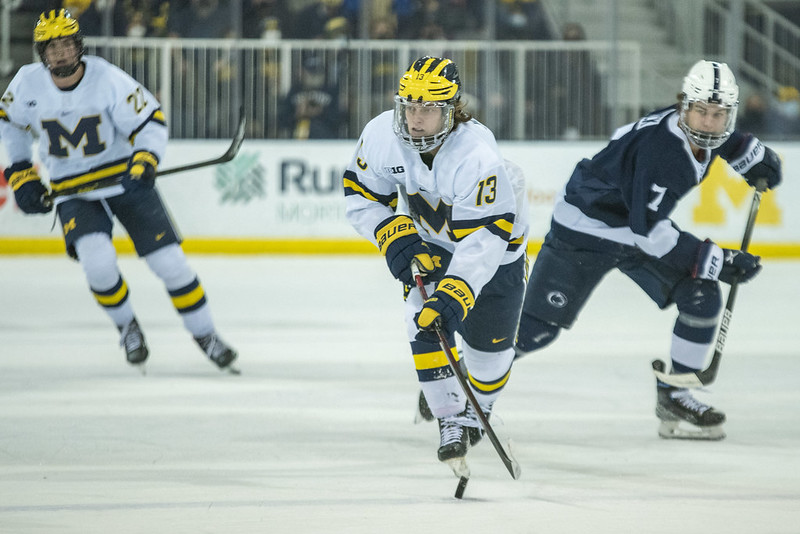
[James Coller]
Exit: Kent Johnson
The other name who signed quickly after Michigan's season ended was Kent Johnson, inking an entry level contract with the Columbus Blue Jackets, who drafted him 5th overall last summer. Johnson played two seasons at Michigan, like Power, and was one of Michigan's highest scorers both seasons. Johnson never scored in double figures for goals, but racked up assists to boost his lofty point totals, scoring 37 this season in only 32 games. Like Power, Johnson played with Team Canada at the WJC and at the Olympics, meaning that he missed about a quarter of the season. Johnson spent most of his Michigan career on a line with Matty Beniers, playing the wing almost wire-to-wire, with one series against Minnesota in December 2020 being the exception.
His NHL potential: Johnson is the player of this group that I'm most fascinated by when it comes to his NHL future. Johnson is a player with a clear set of skills, and also a clear set of weaknesses. Johnson has very good hands and the ability to make dangles/dekes that few other players can, even at the NHL level. His shot is also not bad at all. On the other hand, the aforementioned skill does not achieve as much as it should. He makes a lot of neat plays but they don't often lead to much of anything, and he had a tendency to rack up secondary assists that pad his point totals, which empirically are mostly random and not indicative of a player's success, generally speaking. Moreover, Johnson remains extremely skinny and does not engage physically in the corners. Finally, Johnson plays at a very slow pace, always preferring to slow the game down when the puck is on his stick rather than keep moving.
The concern with this approach to the game is pretty obvious when we're talking about the NHL: it is the fastest and biggest league in the world. Players in the NHL are far bigger, stronger, and more physical than the NCAA and if Johnson didn't want to play the physical side in college, what does that mean for the NHL? Additionally, NHLers take away time and space, and the hallmark of a great NHLer is one who can think and execute high-level plays on the fly. Johnson didn't show that much at Michigan. He's not going to get the same amount of time to stop and contemplate the play in the NHL.
Players who play a more meandering pace in the NHL tend to be big, burly players who give themselves that extra time because they can shield the puck from opponents with their body. These are folks like Ryan Getzlaf or Evgeni Malkin. Johnson is not that size and will never be. He's going to need to either figure out how to speed himself up, or completely change his approach. Drafting him in the top five was a major swing by Columbus and KJ will get his chance to make it work, but I have my concerns.
[AFTER THE JUMP: More guys]
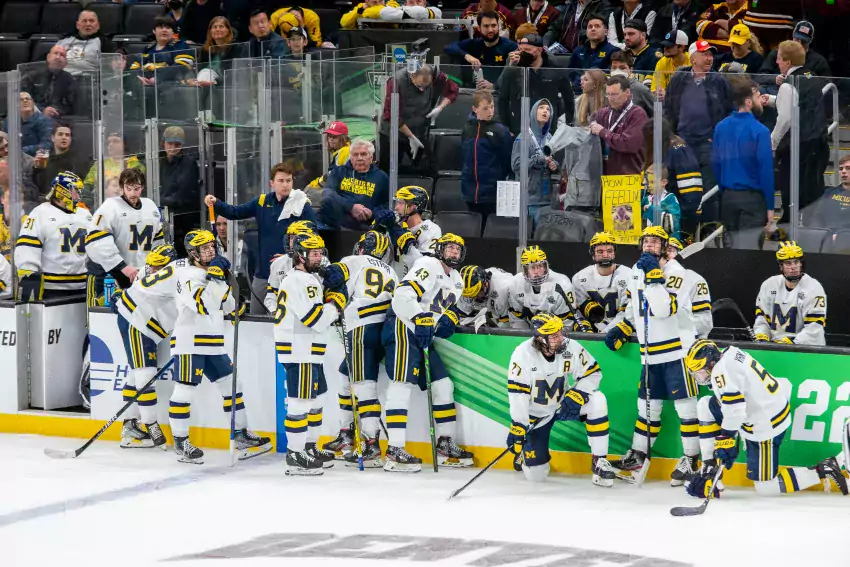
4/7/2022 – Denver 3, Michigan 2 (OT) – 31-10-1, Season Over
They call the sort of overtime that is played in the NCAA Hockey Tournament "sudden death". The moniker makes logical sense- when a goal is scored, the game is suddenly over and the team that loses has died the "sudden death". That is the sort of death that the 2021-22 Michigan Hockey team suffered at the Frozen Four in Boston, losing on a Carter Savoie overtime "sudden death" winner against Denver. It came suddenly indeed, on a play that started as a mistake, with two Wolverines overskating a loose puck waiting to be cleared from the zone, before the Pioneers seized it and quickly turned it into a dangerous pass and then a goal. It was a quick departure from an overtime period that Michigan had largely controlled play in, and that's where the sudden nature is valid.
But at the same time, the death that this hockey team died was not completely sudden. In some ways, it was slow. The slow death march of sorts began when the team took the ice for the opening puck drop and were completely devoid of energy. Throughout the first period, one could have said Michigan was as flat as the Iowa landscape. They were outplayed by Denver handily in the opening frame and though they had better second and third periods, Michigan was the lesser team in the entire sixty minutes of regulation. They amassed far fewer shots on net and scoring opportunities than Denver, using the magic of Erik Portillo and a pair of fortunate bounces to keep the game even and push it to the extra session.
That sensation of never leading, frequently being on their heels, and struggling to keep up made it feel like Michigan was dying a slow death. Outside of two good looks in the overtime period, there were few moments where the fan pulse indicated that the Maize & Blue were going to actually come out of the game victorious. As the seconds rolled away, it merely felt like we were getting closer to finding out when the true moment of death would be. The Savoie overtime goal was just the final blow that sealed the slow death known as a lackluster performance in the biggest game of the season. From that view, it wasn't so sudden, but rather the final punctuation that made your author think "yeah, that seems right".
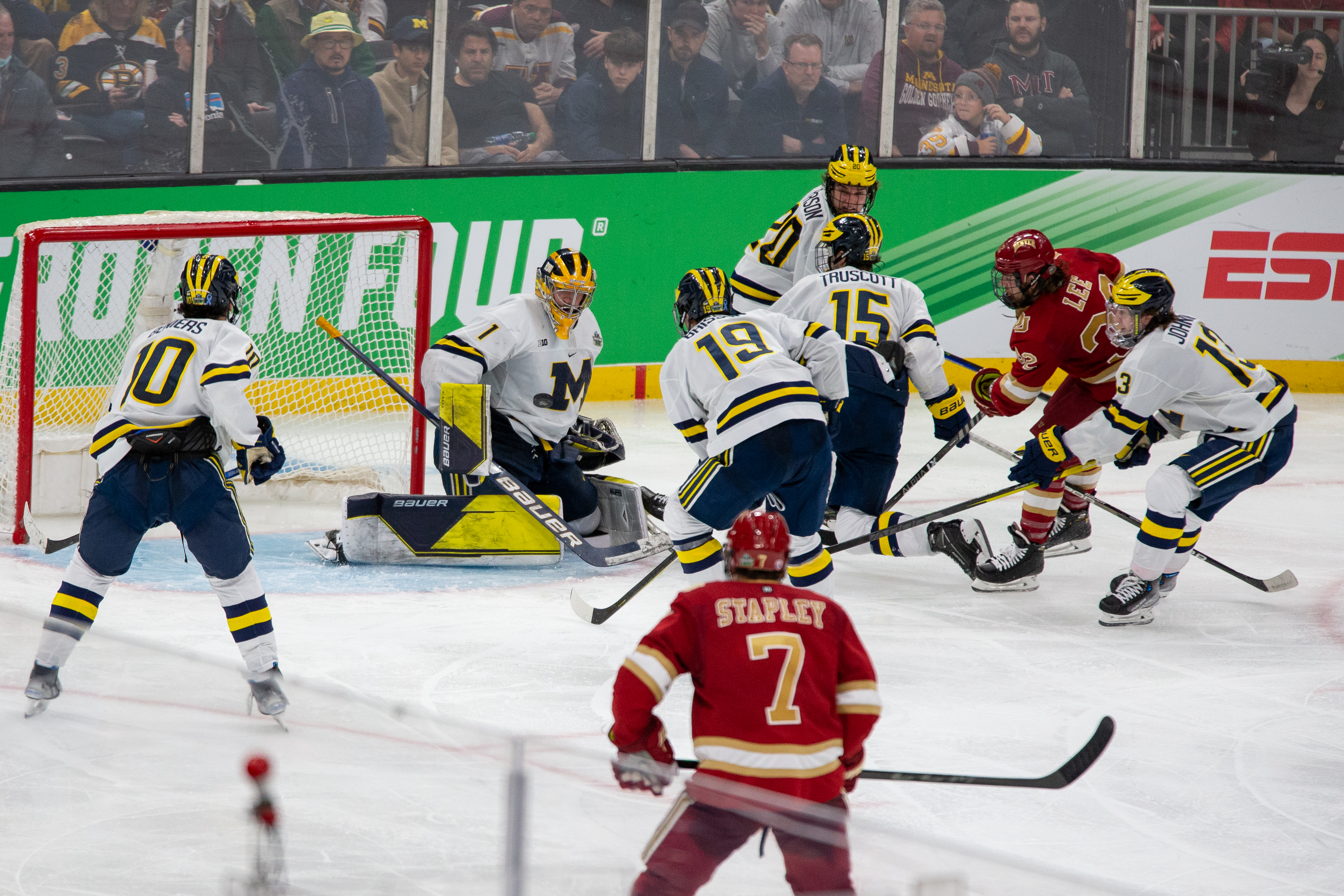
[David Wilcomes]
Moreover, one, particularly someone with a longer sense of fandom for Michigan Hockey, may be able to argue that the slow death began when Michigan got to overtime in the first place, because NCAA Tournament overtimes have been downright disastrous for the Wolverines over the past two decades. Especially those taking place in the Regional Final or later. Starting with the 2003 season, Michigan is 0-6 in overtime games taking place in that round of the tournament or lataer. They also lost a game to Notre Dame in the Frozen Four in 2018 in the dwindling seconds of regulation, which at that point is essentially overtime, and were also stunningly upset in the first round of the 2009 tournament in overtime by Air Force. The only redeeming moments in that span are a pair of OT wins in the first round in 2011 and 2016.
Getting to overtime in a round like the Frozen Four meant that to the most snakebitten of fans, the slow death began at that moment. We were doomed the moment the puck dropped on the extra session and the only sudden element of the death was the goal that put us out of our misery. Perhaps this was a particularly cynical view, but for the diehard Michigan Hockey fans, this was a mindset inhabited the moment overtime began.
That is the nature of a loss with so many doom-related factors: a poor showing in regulation casting an ominous sense of failure, only to be tossed the dual-sided bone of hope and also hopelessness called overtime. The slow death began when we saw the performance the team put on in regulation, then continued when we started to realize the only way for *Michigan* to win the game was *overtime in a Frozen Four*, before a quick mirage of aspiration when Luke Hughes rushed down the ice on a 2 on 1, followed by the dashing of said mirage when the puck wound up in the chest of Magnus Chrona, and finally brought home by the Savoie goal. At that moment, as Erik Portillo stared down into the ice while experiencing the agony of defeat, it was full circle. The slow and sudden nature of this cruel death had converged, and the season was over. The torture of the Frozen Four, and overtime in that round, lives on.
[AFTER THE JUMP: Making peace with the end]

Two wins to a title
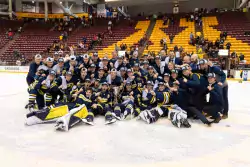
raise that chalice!
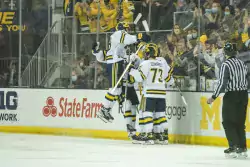
Sweet victory (but we're not there yet)
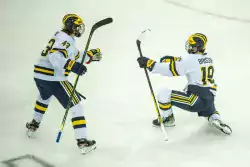
Finally...
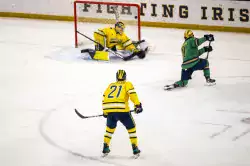
A very good team enters the postseason with nothing much accomplished yet
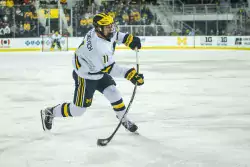
We could have used the Wisconsin Bad photo. This time it's more Michigan Good.
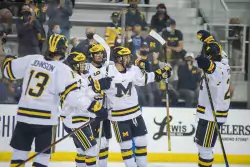
You know when you play well and lose, but then play worse and win? Yeah, it's kinda like that.
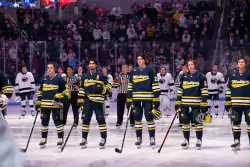
Michigan sends four active hockey players to the Beijing games (and two alumni!)
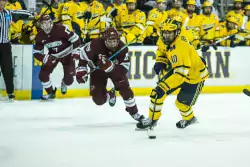
Olympics in the picture, the WJC down in flames, a cancelation kerfuffle, and a bulldozing of UMass. Lots going on!
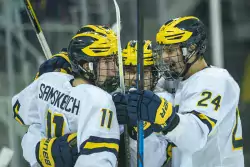
We still have a hockey team!
2